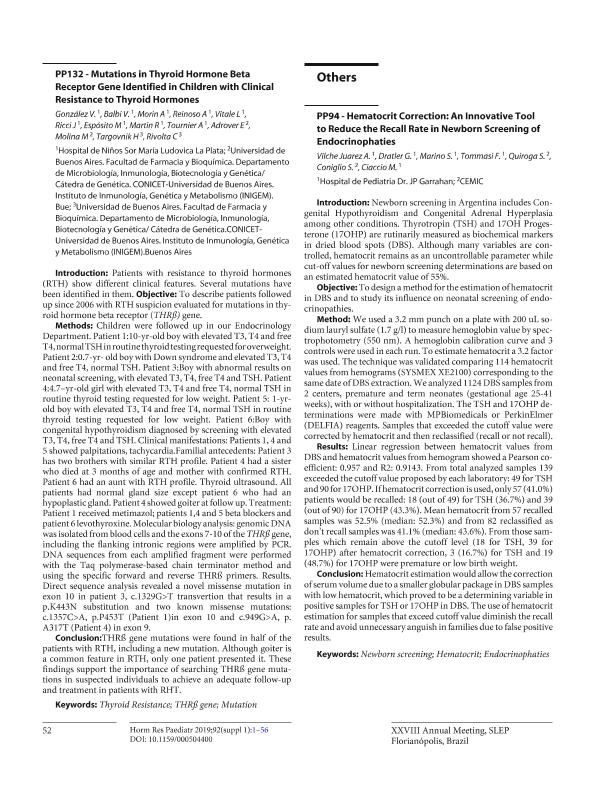Evento
Mutations in Thyroid Hormone Beta Receptor Gene Identified in Children with Clinical Resistance to Thyroid Hormones
Gonzáles, Viviana; Balbi, Viviana A.; Morin, Analía; Reinoso, Andrea; Vitale, Laura; Ricci, Jaime; Espósito, Mariela; Martín, Rodrigo; Tournier, Andrea L.; Adrover, Ezequiela ; Molina, Maricel Fernanda
; Molina, Maricel Fernanda ; Targovnik, Hector Manuel
; Targovnik, Hector Manuel ; Rivolta, Carina Marcela
; Rivolta, Carina Marcela
 ; Molina, Maricel Fernanda
; Molina, Maricel Fernanda ; Targovnik, Hector Manuel
; Targovnik, Hector Manuel ; Rivolta, Carina Marcela
; Rivolta, Carina Marcela
Tipo del evento:
Congreso
Nombre del evento:
XXVIII Congreso Latinoamericano de Endocrinología Pediátrica
Fecha del evento:
20/11/2019
Institución Organizadora:
Sociedad Latinoamericana de Endocrinología Pediátrica;
Título de la revista:
Hormone Research in Paediatrics
Editorial:
Karger
ISSN:
1663-2818
Idioma:
Inglés
Clasificación temática:
Resumen
Introduction: Patients with resistance to thyroid hormones(RTH) show different clinical features. Several mutations have been identified in them.Objective:To describe patients followed up since 2006 with RTH suspicion evaluated for mutations in thyroid hormone beta receptor(THRß)gene.Methods:Children were followed up in our Endocrinology Department.Patient 1:10-yr-old boy with elevated T3, T4 and free T4, normal TSH in routine thyroid testing requested for overweight. Patient 2:0.7-yr- old boy with Down syndrome and elevated T3, T4 and free T4, normal TSH.Patient 3:Boy with abnormal results on neonatal screening, with elevated T3, T4, free T4 and TSH.Patient 4:4.7?yr-old girl with elevated T3, T4 and free T4, normal TSH in routine thyroid testing requested for low weight.Patient 5: 1-yr- old boy with elevated T3, T4 and free T4, normal TSH in routine thyroid testing requested for low weight.Patient 6:Boy with congenital hypothyroidism diagnosed by screening with elevated T3, T4, free T4 and TSH.Clinical manifestations:Patients 1, 4 and 5 showed palpitations, tachycardia.Familial antecedents: Patient 3 has two brothers with similar RTH profile. Patient 4 had a sister who died at 3 months of age and mother with confirmed RTH. Patient 6 had an aunt with RTH profile.Thyroid ultrasound. All patients had normal gland size except patient 6 who had an hypoplastic gland. Patient 4 showed goiter at follow up.Treatment:Patient 1 received metimazol; patients 1,4 and 5 beta blockers and patient 6 levothyroxine.Molecular biology analysis: genomic DNA was isolated from blood cells and the exons 7-10 of the THRß gene, including the flanking intronic regions were amplified by PCR. DNA sequences from each amplified fragment were performed with the Taq polymerase-based chain terminator method and using the specific forward and reverse THRß primers. Results.Direct sequence analysis revealed a novel missense mutation in exon 10 in patient 3, c.1329G>T transvertion that results in a p.K443N substitution and two known missense mutations: c.1357C>A, p.P453T (Patient 1)in exon 10 and c.949G>A, p.A317T (Patient 4) in exon 9.Conclusion:THRß gene mutations were found in half of the patients with RTH, including a new mutation.Although goiter is a common feature in RTH, only one patient presented it.These findings support the importance of searching THRßgene mutations in suspected individuals to achieve an adequate follow-up and treatment in patients with RHT.
Palabras clave:
THROID RESISTANCE
,
THYROID HORMONE RECEPTOR BETA
,
THRBETA GENE
,
MUTATIONS
Archivos asociados
Licencia
Identificadores
Colecciones
Eventos(INIGEM)
Eventos de INSTITUTO DE INMUNOLOGIA, GENETICA Y METABOLISMO
Eventos de INSTITUTO DE INMUNOLOGIA, GENETICA Y METABOLISMO
Citación
Mutations in Thyroid Hormone Beta Receptor Gene Identified in Children with Clinical Resistance to Thyroid Hormones; XXVIII Congreso Latinoamericano de Endocrinología Pediátrica
; Florianópolis; Brasil; 2019; 52-52
Compartir
Altmétricas



